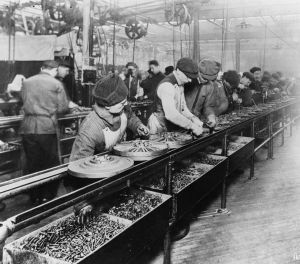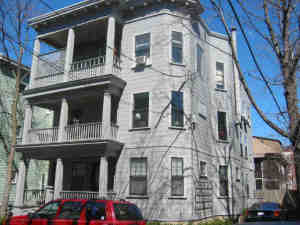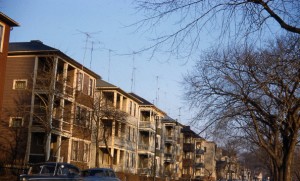How to Find Good Rental Properties for Investment
. Posted in financials, investing, News - 2 Comments
Rental properties can be good investments. We all admire that friend or acquaintance and their passive income. But finding a good rental property and finding a good investment are usually two different things because of timing. We'll look at this key issue of timing with an example.
Introductory Example
Let's suppose there is a rental property with all of the following conditions:
- the building is structurally flawless, with modern plumbing, modern electrical and cosmetically modern cabinets, walls, moulding, and appliances;
- the tenants are lovely people who pay above market rent before the first of each month like clockwork;
- the owner has no mortgage on the place and owns it outright; and
- the place is managed by someone other than the owner.
A property with all of these things would be a good rental property, from the owner's point of view. There are no problems and there's no work for the owner to do.
Is it a good rental property from an investor's point of view? Imagine you come looking to buy this place. Under what circumstances would that owner sell you the property? Our example cuts away any "motivated seller" reason. They have someone else to manage it, so they can move or retire or do anything they want. The tenants aren't giving anyone heartburn. The building is in tip top shape. This is a good rental property!
Economists say there's only one way you're going to get that property. You're going to have to pay the "net present value" of all the money that owner expects to get from the property in the future. Since things are so good, the owner might expect to get an awful lot of money from the property in the future.
In practice, this means you're probably going to have to pay a premium over the real future cash flow. You're trying to entice the owner to trade a building that looks perfect now for a pile of uninvested cash. They love their building and are proud of it. They will not feel quite the same toward a pile of your cash. If they want the same monthly revenue, they will have to find an alternative investment or annuity. Such things may be unknown territory for them. You will have to pay a high price to get this building.
So you see how the time at which you most admire a building is also the most expensive time to get it? We're starting to talk about timing.
Hold that thought and let's ask a basic question:
What's the most important thing in rental real estate?
Are you thinking "location, location, location"? No, that's wrong! It's price. The most important thing in rental real estate is not location, it's price.
Why does price matter so much?
Rental Properties vs Factories: An Example
Imagine you're the manager of a factory. You run the business and your goal is to make as much profit as possible. You have two basic knobs to turn: increase revenue and cut costs.
Revenue is equal to price times volume. In a factory, you can increase revenue by increasing the price, making more stuff (more volume), or doing both.
Costs in a factory are usually related to equipment and efficiency. You can almost always work smarter to make a dent in your costs.
Is the same true for a rental property?

In a factory, you have many options to increase revenue or cut costs. Ford Assembly line, wikipedia.
Rental Property Revenue does not Scale
Rental properties are very different from factories. Your hands are tied when it comes to revenue. Let's look at volume first.
In a rental property, you have almost no way to increase volume. Once your units are fully occupied, that's as much money as you're going to get. Well actually, you have a few options to increase capacity:
- Pack in more people at a lower cost per person. This rapidly gets you into illegal territory in cities like Boston and Worcester, which limit the number of unrelated people that can occupy an apartment.
- Add more units in the basement or attic. This requires rezoning, and sometimes the cost of making the apartment habitable (windows in the attic, toilet pumps in the basement) will cause you to wait a long, long time for that investment to return.
- Add laundry, solar power, or other money making systems.
These will all be tiny improvements, small in comparison to what you're already doing with a fully rented property.
Besides volume, your other factor is price. But if you've signed a lease, your price has been set for the fixed term. And if you have a month-to-month, the tenant could refuse to sign the rent increase. Either way, without the tenant's consent, you cannot alter a rental agreement. You can only evict.
The upshot is this. If you want to get another 20% more revenue from a good rental property, you probably can't. Your only choice is to get another 100% more revenue by buying a second house. That's what we mean when we say revenue does not "scale."
Rental Property Expenses are tied to Purchase Price
Rental properties, like factories, do allow a smart person to reduce the costs of operating. However, consider the three biggest cash expenses:
- interest
- taxes
- insurance
All of these are higher on more expensive properties. If you buy a house twice as much as the next one, you'll pay roughly twice as much interest, twice as much in real estate taxes, and twice as much to insure it. There is next to nothing you can do to lower these expenses.
Minor changes can be made if you refinance, file an abatement, find a different insurer, or insure for a lower value. Generally none of these things will save you more than 20%. You can easily pay two times too much for a house and lock yourself into two times too much expense.
The risk is especially great for smaller buildings like single families, duplexes, and three deckers. The prices of these buildings are determined by prices in the local neighborhood rather than by their investment value. In some neighborhoods home prices are too high for use as a rental property. Just because lots of recent home buyers wanted to live there doesn't mean you should invest there.
So let's go back to our "good rental property" example
In the introductory example, we described a perfect building that was making its owner a lot of money. But if you come along and buy it a high price, especially if you get a mortgage, your three biggest expenses may end up far bigger than the previous owner's. And you may not be able to do anything to improve upon their revenue. You will be locked into a situation where a smart person cannot make any improvements.
This is the first reason why the key issue is timing.
Whether your rental property will ever be looked at as a good investment is decided the moment you offer to purchase.
Think about Competitive Advantage before Offering to Purchase
We think there are only three reliable ways to make a good investment in a rental property. Two of them require buying bad rental properties to start. Here are the three ways:
- Be handy: Buy a wreck or an under-zoned property and renovate it in a way the previous owner didn't or couldn't.
- Be smooth: Buy into a bad tenant situation and smooth talk the bad tenants out and some good tenants in. This category includes the "purchase and evict" option, which might seem forceful, but trust us, it will work better if you're smooth.
- Be rich: Buy without debt or at such a scale that you can do things the previous owner could not (e.g., operate without a mortgage, add a swimming pool amenity, buy carpet by the square mile, etc.)
So do you see what we mean? The best way for a small, ordinary person to make a good investment is to buy a bad rental property with a very well defined plan for making it a good rental property. This puts you in situations where your price will be low enough and your goal will be clear enough that you can succeed.
This is the second reason why the key issue is timing.
What makes a good investment will result in a good rental property years later. Rarely are the two ever to be obtained simultaneously at the closing table.






